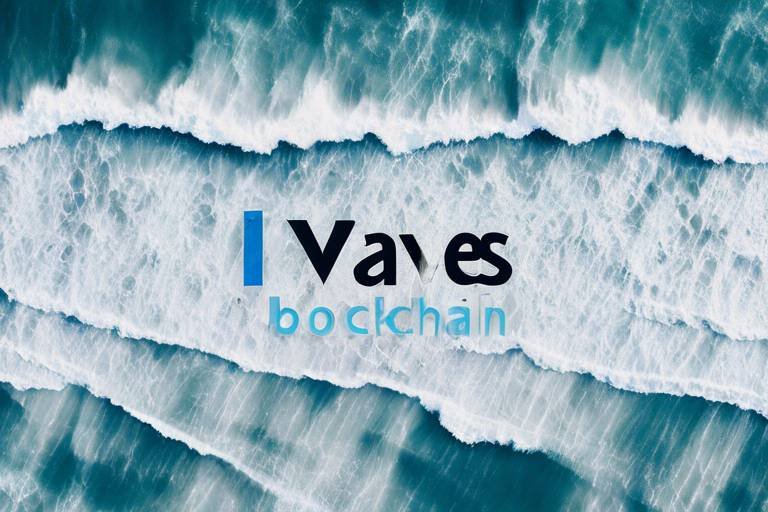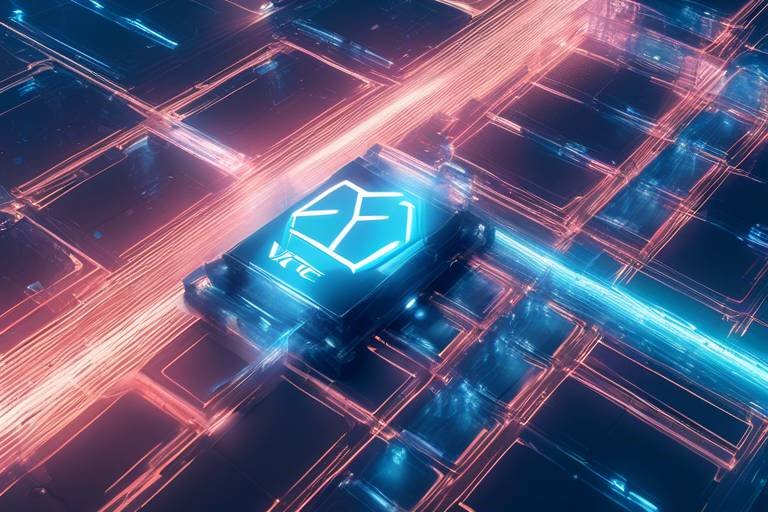Stratis - A Blockchain Solution for Enterprises
In today's fast-paced digital landscape, businesses are constantly seeking innovative solutions to enhance efficiency, security, and transparency. Enter Stratis, a cutting-edge blockchain platform specifically designed for enterprises. This platform not only caters to the unique needs of businesses but also provides a robust framework that integrates seamlessly with existing systems. Imagine a world where transactions are instantaneous, contracts are self-executing, and data integrity is guaranteed; that's the promise Stratis delivers.
Stratis stands out in the crowded blockchain space by offering a comprehensive suite of tools and functionalities that empower enterprises to harness the power of blockchain technology. Its architecture is designed with flexibility and scalability in mind, ensuring that companies of all sizes can leverage its capabilities without a steep learning curve. With Stratis, businesses can innovate at an unprecedented pace while maintaining control over their operations.
The platform's core functionalities include smart contracts, sidechains, and a user-friendly development environment, making it an attractive proposition for organizations looking to implement blockchain solutions. But what exactly does this mean for enterprises? It means reduced operational costs, enhanced security measures, and the ability to streamline processes that were once bogged down by bureaucracy and inefficiency.
As we delve deeper into the features and benefits of Stratis, you'll discover how this platform is not just a technological advancement but a transformative force for businesses across various industries. Whether you're in finance, supply chain management, or healthcare, Stratis offers a tailored approach that can help drive your business forward. So, let's explore the intricate details of Stratis and uncover how it can revolutionize your enterprise operations.

Overview of Stratis
Stratis is not just another blockchain platform; it's a comprehensive solution tailored specifically for enterprises. Imagine a world where businesses can harness the power of blockchain technology without the typical complexities associated with it. Stratis aims to bridge that gap, offering a platform that combines flexibility and scalability to meet the unique needs of various industries. At its core, Stratis is built on a robust architecture that allows companies to deploy their own private blockchains, ensuring that they maintain control over their data and operations.
One of the standout features of Stratis is its ability to integrate seamlessly with existing systems, which is crucial for enterprises looking to adopt blockchain without overhauling their entire infrastructure. The platform supports multiple programming languages, making it easier for developers to create customized solutions that cater to specific business requirements. This adaptability is key in today’s fast-paced business environment, where innovation and efficiency are paramount.
Furthermore, Stratis emphasizes security, providing enterprises with peace of mind as they transition to blockchain technology. By leveraging smart contracts and sidechains, Stratis not only enhances operational efficiency but also ensures that transactions are secure and transparent. In essence, Stratis is more than just a blockchain; it's a transformative tool that empowers businesses to innovate while minimizing risk.
In summary, Stratis offers a user-friendly, flexible, and secure blockchain solution that meets the demands of modern enterprises. Its unique features and capabilities position it as a frontrunner in the blockchain space, making it an attractive option for businesses looking to leverage technology for growth and efficiency.

Key Features of Stratis
Stratis is not just another blockchain platform; it’s a comprehensive solution designed specifically for enterprises. It offers a multitude of features that cater to the unique needs of businesses across various sectors. One of the standout features of Stratis is its ability to integrate seamlessly with existing systems, allowing companies to adopt blockchain technology without overhauling their entire infrastructure. This flexibility is crucial for enterprises that wish to innovate while minimizing disruption.
Another significant feature of Stratis is its support for smart contracts. These self-executing contracts are programmed to automatically enforce and execute the terms of an agreement when certain conditions are met. This not only speeds up transactions but also reduces the need for intermediaries, making processes more efficient. Imagine a world where contracts are executed instantly and without the need for lawyers or lengthy negotiations—this is the promise of smart contracts on the Stratis platform.
Additionally, Stratis utilizes sidechains, which are independent blockchains that are linked to the main Stratis blockchain. This architecture allows for enhanced scalability and performance. By offloading transactions to sidechains, Stratis can handle a larger volume of transactions without compromising speed or security. This is particularly important for enterprises that require high throughput and low latency in their operations.
Moreover, Stratis provides a robust development environment that supports multiple programming languages. This flexibility empowers developers to create tailored blockchain solutions that meet specific business needs. Whether you’re a fan of C#, Java, or even Python, Stratis has you covered. This multi-language support means that companies can leverage their existing developer talent instead of needing to hire specialists in blockchain technology.
To further enhance the development experience, Stratis offers an array of tools and resources. From comprehensive documentation to software development kits (SDKs), these resources facilitate the creation and deployment of blockchain applications. Developers can focus on building innovative solutions rather than getting bogged down by technical hurdles. The availability of these tools is a game-changer for enterprises looking to embrace blockchain technology.
Finally, the strength of the Stratis platform lies in its community and support. A vibrant community of developers, users, and enthusiasts contributes to the platform's growth and evolution. Stratis provides various support channels, including forums, tutorials, and dedicated customer service, ensuring that users have the assistance they need to succeed. This sense of community is invaluable, as it fosters collaboration and knowledge sharing among users.
In summary, the key features of Stratis—smart contracts, sidechains, a flexible development environment, and a supportive community—create a powerful platform that can drive innovation in enterprises. Businesses looking to leverage blockchain technology will find that Stratis not only meets their needs but also empowers them to take bold steps into the future.

Smart Contracts
Smart contracts are one of the most exciting features of the Stratis platform, acting as the backbone for automated transactions and processes. Imagine a world where contracts execute themselves without the need for a middleman—this is the essence of smart contracts. They are self-executing contracts with the terms of the agreement directly written into code. This means that once the conditions are met, the contract automatically enforces the agreement, ensuring that all parties involved can trust the process without having to rely on an intermediary.
The significance of smart contracts in the Stratis ecosystem cannot be overstated. They not only enhance operational efficiency but also drastically reduce transaction times and costs. By eliminating the need for intermediaries, businesses can save both time and money. Think of smart contracts as a digital handshake—once the conditions are agreed upon, the deal is sealed without any fuss. This level of automation allows enterprises to focus on what really matters: growing their business and serving their customers.
One of the standout benefits of using smart contracts on the Stratis platform is their ability to increase transparency. Since all transactions are recorded on the blockchain, every party can verify the contract's execution without any ambiguity. This transparency builds trust among stakeholders and can be particularly beneficial in industries where trust is paramount, such as finance, real estate, and supply chain management.
Furthermore, the security aspect of smart contracts is impressive. They are cryptographically secured, making them resistant to tampering or fraud. This means that once a smart contract is deployed, it is nearly impossible to alter it without the consensus of all parties involved. Therefore, businesses can operate with peace of mind, knowing that their contracts are secure and immutable.
To illustrate the power of smart contracts, let’s look at some real-world use cases:
- Supply Chain Management: Smart contracts can automate the tracking of goods as they move through the supply chain, releasing payments only when goods are verified to have been delivered.
- Real Estate Transactions: In real estate, smart contracts can streamline the buying and selling process by automatically transferring ownership once payment is received.
- Insurance Claims: Smart contracts can automate the claims process in insurance by triggering payments when specific conditions are met, such as weather events for crop insurance.
As we can see, the applications for smart contracts are vast and varied, making them a valuable tool across numerous industries. They not only help in reducing costs and increasing efficiency but also foster a more trustworthy and secure environment for conducting business. With Stratis, enterprises can leverage these advantages to stay competitive in today’s fast-paced market.

Benefits of Smart Contracts
Smart contracts are revolutionizing the way businesses operate, offering a plethora of benefits that can significantly enhance efficiency and reduce costs. Imagine a world where contracts execute automatically, without the need for intermediaries—this is the reality that smart contracts bring to the table. By utilizing blockchain technology, these digital agreements ensure that all parties involved adhere to the terms set forth, eliminating the possibility of disputes or misunderstandings.
One of the most compelling advantages of smart contracts is their ability to reduce operational costs. Traditional contract management often involves numerous intermediaries, each taking a cut of the transaction. With smart contracts, the need for these middlemen is virtually eliminated. This not only lowers costs but also speeds up the entire process. For instance, in real estate transactions, smart contracts can automate the transfer of ownership once payment is made, cutting down on the time and fees associated with closing costs.
Another significant benefit is transparency. All transactions executed via smart contracts are recorded on the blockchain, creating an immutable ledger that can be audited at any time. This level of transparency fosters trust among parties, as everyone has access to the same information. In industries like supply chain management, this can be a game-changer. Companies can track products from origin to destination, ensuring that every step of the process is visible and verifiable.
In addition to cost savings and transparency, smart contracts also offer enhanced security. Traditional contracts are vulnerable to tampering and fraud, but smart contracts are secured by cryptographic algorithms, making them nearly impossible to alter once they are deployed. This security aspect is crucial for industries that deal with sensitive information, such as finance and healthcare. By ensuring that contracts cannot be changed after the fact, businesses can operate with peace of mind, knowing that their agreements are safe from malicious attacks.
Moreover, the automation of processes through smart contracts leads to increased efficiency. By eliminating manual tasks, businesses can focus on what really matters—growing and innovating. For example, a company utilizing smart contracts for payroll can automate the payment process based on predefined conditions, ensuring that employees are paid on time without the need for manual intervention. This not only saves time but also reduces human error, allowing for a smoother operation overall.
To sum it up, the benefits of smart contracts are profound and far-reaching. They not only streamline operations but also bring about a new level of trust and security in business transactions. As more enterprises recognize these advantages, the adoption of smart contracts is likely to accelerate, paving the way for a more efficient and transparent business landscape.
- What are smart contracts? Smart contracts are self-executing contracts with the terms of the agreement directly written into code, enabling automatic execution without intermediaries.
- How do smart contracts enhance security? They are secured by cryptographic algorithms, making them resistant to tampering and unauthorized changes.
- Can smart contracts be audited? Yes, all transactions are recorded on the blockchain, allowing for complete transparency and auditability.
- What industries can benefit from smart contracts? Industries such as real estate, finance, healthcare, and supply chain management can significantly benefit from the efficiency and security offered by smart contracts.

Use Cases for Smart Contracts
Smart contracts are revolutionizing the way businesses operate across various industries. Their ability to automate processes and enforce agreements without the need for intermediaries is a game-changer. Imagine a world where contracts execute automatically, reducing human error and increasing trust. Let's dive into some exciting use cases that illustrate the power of smart contracts.
One of the most impactful applications of smart contracts is in the financial services sector. They can facilitate everything from automated loan agreements to real-time settlement of trades. For instance, a smart contract could automatically release funds for a loan once certain conditions are met, such as verifying the borrower's creditworthiness. This not only speeds up the process but also minimizes the risk of fraud, as all transactions are recorded on the blockchain.
In the realm of real estate, smart contracts can streamline property transactions. Traditionally, buying or selling a property involves numerous intermediaries, including agents, lawyers, and banks. With smart contracts, the entire process can be simplified. For example, a smart contract can hold the deposit and automatically transfer ownership once the payment is confirmed, eliminating the need for extensive paperwork and reducing transaction times significantly.
Another fascinating use case is in the field of supply chain management. Here, smart contracts can enhance transparency and traceability. By embedding smart contracts into the supply chain, companies can track the movement of goods in real-time. This means that if a product is delayed or doesn't meet quality standards, the smart contract can automatically trigger penalties or refunds. This level of automation not only improves efficiency but also builds trust among stakeholders.
Moreover, the healthcare industry can greatly benefit from smart contracts. Patient data can be securely stored and shared using blockchain technology, with smart contracts managing access rights. For example, a patient could grant a hospital access to their medical records for a specific duration, and the smart contract would ensure that this access is revoked once the period expires. This ensures patient privacy while allowing healthcare providers to deliver better services.
Lastly, the gaming industry is exploring the use of smart contracts to create decentralized gaming platforms. These contracts can manage in-game assets, ensuring that players truly own their items and can trade them freely without the interference of a central authority. Imagine a scenario where you earn a rare item in a game, and a smart contract guarantees its authenticity and ownership, allowing you to sell it on a marketplace seamlessly.
In conclusion, the potential applications of smart contracts are vast and varied. From automating financial transactions to enhancing supply chain transparency, they offer solutions that can drive efficiency and trust across industries. As businesses continue to explore these innovative technologies, we can expect to see even more creative use cases emerge, further solidifying the role of smart contracts in the future of enterprise operations.
- What are smart contracts? Smart contracts are self-executing contracts with the terms of the agreement directly written into code. They automatically enforce and execute the terms when predefined conditions are met.
- How do smart contracts improve efficiency? By automating processes and eliminating intermediaries, smart contracts reduce transaction times and costs, allowing for faster and more reliable business operations.
- Can smart contracts be used in any industry? Yes, smart contracts have applications across various sectors, including finance, real estate, supply chain management, healthcare, and gaming.
- Are smart contracts secure? Smart contracts operate on blockchain technology, which provides a high level of security through encryption and decentralization, making them difficult to tamper with.

Sidechains
When it comes to scaling blockchain solutions, play a pivotal role in the Stratis ecosystem. Imagine a bustling highway where traffic can become a nightmare during rush hour. This is akin to a blockchain network that struggles to handle a high volume of transactions. Sidechains act like alternate routes, allowing transactions to flow smoothly without congesting the main network. By utilizing sidechains, Stratis can enhance its scalability and performance, ensuring that enterprises can operate efficiently without the typical bottlenecks associated with traditional blockchain systems.
So, what exactly are sidechains? In simple terms, they are separate blockchains that are attached to the main blockchain (or mainchain) through a two-way peg. This means that assets can be transferred back and forth between the mainchain and the sidechain, allowing for greater flexibility. For enterprises, this is a game changer. It enables them to run specific applications or processes on a sidechain that may require different rules or functionalities than those on the mainchain. For instance, a company might want to test a new feature or conduct a private transaction without affecting the public ledger. Sidechains provide that freedom.
Moreover, the use of sidechains significantly reduces the load on the mainchain. By offloading certain transactions and operations to sidechains, Stratis can maintain a high level of performance and speed. This is particularly important for enterprises that require real-time processing and quick decision-making. The ability to handle a larger volume of transactions without compromising on speed or efficiency is a critical advantage in today's fast-paced business environment.
Another fascinating aspect of sidechains is their potential for experimentation and innovation. Developers can create and deploy new features on a sidechain without the fear of disrupting the main network. This sandbox-like environment encourages creativity and allows for rapid testing of new ideas. Once a sidechain application has proven its effectiveness, it can be integrated back into the mainchain, benefiting the entire network. This iterative process fosters continuous improvement and keeps the Stratis platform at the forefront of blockchain technology.
In summary, sidechains are not just a technical feature of the Stratis platform; they represent a fundamental shift in how enterprises can leverage blockchain technology. By providing a scalable, flexible, and innovative environment, Stratis empowers businesses to explore new possibilities and streamline their operations. The future of enterprise blockchain looks bright, and sidechains are a key part of that vision.
- What are sidechains? Sidechains are separate blockchains linked to the main blockchain, allowing for the transfer of assets and transactions without congesting the main network.
- How do sidechains improve scalability? By offloading transactions to sidechains, the main blockchain can operate more efficiently, handling more transactions without slowing down.
- Can sidechains be used for testing new features? Yes, sidechains provide a safe environment for developers to experiment and test new functionalities without affecting the main blockchain.
- How does Stratis benefit from using sidechains? Stratis enhances its performance, scalability, and innovation capabilities, allowing enterprises to utilize the blockchain more effectively.

Development Environment
The Stratis platform is designed with a user-friendly development environment that stands out in the crowded blockchain ecosystem. It supports multiple programming languages, allowing developers to leverage their existing skills and knowledge. This flexibility is crucial because it empowers developers to create tailored blockchain solutions that align perfectly with their business needs. Imagine being able to write code in your favorite language while building robust applications that can operate on a decentralized network—this is exactly what Stratis offers!
One of the most exciting aspects of Stratis is its commitment to accessibility. The platform provides a rich set of tools and resources that make it easier for developers at any skill level to dive into blockchain development. Whether you’re a seasoned programmer or just starting, Stratis ensures that you have everything you need to succeed. The comprehensive documentation, tutorials, and sample projects available on their website serve as excellent starting points for anyone looking to explore the platform.
Moreover, Stratis integrates seamlessly with popular development environments, enhancing the overall user experience. Developers can use familiar tools such as Visual Studio for their projects, which means they can focus more on creating innovative solutions rather than getting bogged down by unfamiliar software. This compatibility not only speeds up the development process but also encourages more developers to join the Stratis community.
To give you a clearer picture, let’s take a look at some of the key components of the Stratis development environment:
| Component | Description |
|---|---|
| Multi-Language Support | Developers can use C#, .NET, and other languages to build applications. |
| Rich Documentation | Comprehensive guides and tutorials help developers navigate the platform. |
| Sample Projects | Pre-built projects that serve as templates for new applications. |
| Integration with IDEs | Compatibility with tools like Visual Studio enhances the development experience. |
In addition to these components, Stratis also fosters a collaborative environment. The community around Stratis is vibrant and supportive, with forums and discussion boards where developers can share ideas, ask for help, and collaborate on projects. This sense of community is invaluable, especially for those who are new to blockchain technology and may feel overwhelmed by the complexities involved.
Ultimately, the development environment provided by Stratis is not just about coding; it’s about creating an ecosystem where innovation can thrive. By lowering the barriers to entry and offering extensive support, Stratis is paving the way for businesses to harness the power of blockchain technology effectively. So, if you’re looking to build the next big thing in the blockchain space, Stratis might just be the perfect platform for you!
- What programming languages does Stratis support?
Stratis primarily supports C# and .NET, allowing developers to use familiar languages for blockchain development. - Is there community support available for new developers?
Yes, Stratis has a strong community that offers forums, tutorials, and resources to assist new developers. - Can I integrate Stratis with existing software?
Absolutely! Stratis is designed to integrate seamlessly with popular development tools and environments. - Are there any resources for learning Stratis?
Yes, Stratis provides extensive documentation, sample projects, and tutorials to help you get started.

Tools and Resources
Stratis provides a rich array of that empower developers to create and deploy blockchain applications with ease. One of the standout features of the Stratis platform is its commitment to fostering a robust development ecosystem. This ecosystem includes a variety of integrated development environments (IDEs), software development kits (SDKs), and comprehensive documentation that cater to both novice and experienced developers alike.
Imagine stepping into a fully equipped workshop where every tool you need is at your fingertips. That’s what Stratis offers to its developers. The platform supports multiple programming languages, making it versatile and accessible. Whether you prefer C#, JavaScript, or Python, Stratis has you covered. This flexibility not only broadens the talent pool for enterprises looking to implement blockchain solutions but also accelerates the development process.
Moreover, Stratis offers a visual studio plugin that simplifies the development workflow. This plugin allows developers to write, test, and deploy smart contracts directly from the familiar Visual Studio environment. It’s like having a personal assistant that organizes your tasks and ensures you stay on track. With this tool, developers can focus more on innovation rather than getting bogged down by complex coding challenges.
In addition to the IDEs and SDKs, Stratis also provides extensive documentation and tutorials that guide developers through various processes. These resources are crucial for understanding the intricacies of blockchain technology and how to leverage Stratis effectively. The documentation is structured to cater to different learning styles, offering both step-by-step guides and in-depth technical references. This ensures that developers can find the information they need quickly, whether they are troubleshooting an issue or exploring new features.
Furthermore, the Stratis platform hosts a vibrant community of developers who actively contribute to forums, share insights, and collaborate on projects. This community is a treasure trove of knowledge, where developers can ask questions and receive answers from their peers. Engaging with this community not only enhances individual learning but also fosters a sense of belonging among developers who are passionate about blockchain technology.
To summarize, the tools and resources provided by Stratis are designed to make the development process as seamless and efficient as possible. By offering a range of IDEs, SDKs, comprehensive documentation, and a supportive community, Stratis empowers developers to bring their innovative ideas to life. As the blockchain landscape continues to evolve, having access to such resources is invaluable for enterprises looking to stay ahead of the curve.
- What programming languages does Stratis support? Stratis supports multiple programming languages, including C#, JavaScript, and Python, making it accessible to a wide range of developers.
- Is there a community for Stratis developers? Yes, Stratis has a vibrant community where developers can share insights, ask questions, and collaborate on projects.
- What types of tools does Stratis provide for developers? Stratis offers a visual studio plugin, SDKs, and extensive documentation to assist developers in creating and deploying blockchain applications.

Community and Support
The Stratis community is one of its most valuable assets, acting as a vibrant ecosystem where developers, enterprises, and enthusiasts come together to share knowledge, resources, and support. This community is not just a group of individuals; it's a collaborative network that fosters innovation and encourages participation. Whether you're a seasoned developer or a newcomer to the blockchain space, the Stratis community is welcoming and eager to help you navigate the complexities of blockchain technology.
One of the standout features of the Stratis community is its commitment to open communication. The platform offers various channels for users to connect, including forums, social media groups, and dedicated support channels. This ensures that help is always just a message away. For example, the official Stratis Forum serves as a hub for discussions, where users can ask questions, share experiences, and collaborate on projects.
Moreover, Stratis provides extensive documentation and resources to help users get started. The documentation covers everything from basic concepts to advanced programming techniques, making it easier for developers to build and deploy blockchain applications. Additionally, the platform hosts regular webinars and workshops, allowing users to learn directly from experts in the field. This educational approach not only enhances user knowledge but also strengthens the community as a whole.
In terms of support, Stratis offers multiple avenues for assistance. Users can access technical support through their support ticket system, ensuring that issues are addressed promptly. The community also actively engages in troubleshooting and problem-solving, with many experienced users willing to lend a hand. This collaborative spirit is vital for user success, as it creates an environment where everyone can learn and grow together.
To summarize, the Stratis community is a cornerstone of the platform, providing essential support, resources, and collaboration opportunities. Whether you're looking for help with a specific issue or seeking to connect with like-minded individuals, the Stratis community is a fantastic place to start your journey into the world of blockchain technology.
- What is Stratis? Stratis is a blockchain platform designed specifically for enterprises, offering a range of features to enhance business operations.
- How can I get involved with the Stratis community? You can join the Stratis community through their official forum, social media channels, and by participating in webinars and workshops.
- What support options are available for Stratis users? Stratis provides technical support through a ticketing system and encourages community engagement for problem-solving.
- Are there resources available for developers? Yes, Stratis offers comprehensive documentation, tools, and resources to assist developers in creating blockchain applications.
Frequently Asked Questions
- What is Stratis?
Stratis is a blockchain platform specifically designed for enterprises. It offers a comprehensive solution that combines flexibility and scalability, making it ideal for businesses looking to implement blockchain technology.
- How do smart contracts work in Stratis?
Smart contracts in Stratis are self-executing contracts with the terms of the agreement directly written into code. They automate transactions and processes, eliminating the need for intermediaries and streamlining business operations.
- What are the benefits of using smart contracts?
Using smart contracts can lead to significant cost savings, increased transparency, and enhanced security for enterprises. They help in reducing errors and fraud, thus improving overall operational efficiency.
- Can you provide examples of use cases for smart contracts?
Absolutely! Industries such as finance, supply chain, and real estate are leveraging smart contracts for various applications, like automating payment processes, tracking shipments, and executing property transfers seamlessly.
- What are sidechains in the context of Stratis?
Sidechains are separate blockchains that are attached to the main Stratis blockchain. They enhance scalability and performance by allowing transactions to be processed off the main chain, which helps in managing network congestion.
- What programming languages does Stratis support?
Stratis provides a user-friendly development environment that supports multiple programming languages, including C#. This flexibility empowers developers to create tailored blockchain solutions that meet specific enterprise needs.
- What tools and resources are available for developers on Stratis?
The Stratis platform offers a variety of tools and resources, such as SDKs, documentation, and tutorials, which facilitate the creation and deployment of blockchain applications, making the development process smoother and more efficient.
- How can I get support for using Stratis?
Stratis has a strong community and support system. You can access help through forums, documentation, and dedicated support channels, ensuring that users have the resources they need to succeed.



















